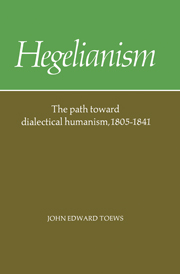Book contents
- Frontmatter
- Contents
- Preface
- Introduction: the Hegelian project in ideological perspective
- PART I PHILOSOPHY AND CULTURAL INTEGRATION: HEGEL IN CONTEXT
- PART II THE HISTORICAL APPROPRIATION OF THE ABSOLUTE: UNITY AND DIVERSITY IN THE HEGELIAN SCHOOL, 1805–1831
- PART III THE REDUCTION OF THE ABSOLUTE TO “MAN”: THE DIVISION OF THE SCHOOL AND THE EMERGENCE OF THE HEGELIAN LEFT, 1830–1841
- EPILOGUE: BEYOND “MAN” – THE RISE AND FALL OF LEFT HEGELIAN HUMANISM
- Notes
- Bibliography
- Index
EPILOGUE: BEYOND “MAN” – THE RISE AND FALL OF LEFT HEGELIAN HUMANISM
Published online by Cambridge University Press: 08 January 2010
- Frontmatter
- Contents
- Preface
- Introduction: the Hegelian project in ideological perspective
- PART I PHILOSOPHY AND CULTURAL INTEGRATION: HEGEL IN CONTEXT
- PART II THE HISTORICAL APPROPRIATION OF THE ABSOLUTE: UNITY AND DIVERSITY IN THE HEGELIAN SCHOOL, 1805–1831
- PART III THE REDUCTION OF THE ABSOLUTE TO “MAN”: THE DIVISION OF THE SCHOOL AND THE EMERGENCE OF THE HEGELIAN LEFT, 1830–1841
- EPILOGUE: BEYOND “MAN” – THE RISE AND FALL OF LEFT HEGELIAN HUMANISM
- Notes
- Bibliography
- Index
Summary
During the summer and fall of 1841 the general principles of philosophical, dialectical humanism that had been developed in the critical writings of Strauss, Bauer, and Feuerbach between 1835 and 1841 were tenuously and temporarily consolidated into the collective ideology of a small but vociferous group of philosophic radicals – the Left Hegelian “movement” or “party.” Although this Left Hegelian movement has attracted an enormous amount of scholarly attention because of its significance in the early intellectual development of Marx and Engels, it was an ephemeral historical phenomenon. Not only for Marx and Engels, but also for thinkers like Bauer and Feuerbach, who have so often been fixated in, retrospectively defined by, their Left Hegelian stance, the Left Hegelian movement was a crucial but limited and passing historical Moment that came to an end in the spring of 1843 when the repressive censorship policy of the Prussian government forced the two major journalistic organs, and only significant organizational focal points of the movement – Ruge's Jahrbiicher and the Rheinische Zeitung – to cease publication. The revolutionary hope that had sustained and unified the Left Hegelian movement, despite internal tensions, throughout 1842 was revealed, by the actual course of historical events, as a self-deceiving illusion.
- Type
- Chapter
- Information
- HegelianismThe Path Toward Dialectical Humanism, 1805–1841, pp. 356 - 369Publisher: Cambridge University PressPrint publication year: 1981



